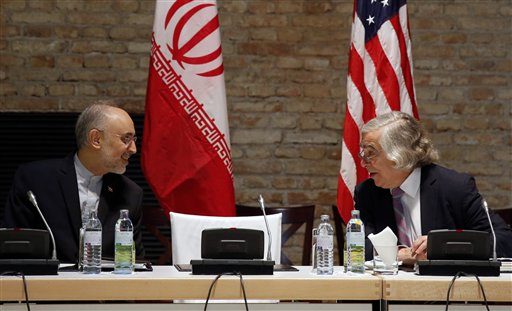
U.S. Secretary of State John Kerry threatened Thursday to walk away from nuclear talks as he signaled that diplomats won’t conclude an agreement with Iran over the coming hours — another delay that this time could complicate American efforts to quickly implement any deal. The Iranians immediately fired back, accusing the U.S. and its European allies of causing the deadlock.
Kerry and other Western officials said Iran still hadn’t made the tough political decision to roll back its nuclear program. But a senior Iranian official said it was the Americans and their partners who were backtracking on several key commitments related to Iran’s permitted level of nuclear activity and definitively ending economic sanctions against Tehran.
“This is not open-ended,” Kerry told reporters outside the 19th-century Viennese palace hosting the negotiations. “We can’t wait forever for the decision to be made. If the tough decisions don’t get made, we are absolutely prepared to call an end to this process.”
It was the strongest indication yet of U.S. frustration with Iran, and vice versa, coming two days after President Barack Obama vowed a similar response to Iranian intransigence and suggesting patience was running out as the current round of talks headed into its 14th day.
Thursday’s latest delay for a comprehensive deal is significant. Iran is demanding prompt easing of economic penalties for nuclear concessions, and the longer it takes world powers to make good on their promises, the longer they’ll have to wait for the Iranians to scale back their nuclear program.
Under U.S. law, the seven nations negotiating in Vienna have to complete the accord before the end of Thursday in Washington to avoid invoking a 60-day congressional review period during which President Barack Obama cannot waive sanctions on Iran. If they meet the target, the review would only be 30 days.
The specter of prolonged public relations campaigns for and against the pact also may not work in Obama’s favor. The delay could imply that the U.S., Iran and other negotiating powers may end up having to push off the talks until September when any deal would again only amount to a 30-day review period.
“We will not rush and we will not be rushed,” Kerry said.
“We would not be here continuing to negotiate just for the sake of negotiating. We’re here because we believe we are making real progress toward a comprehensive deal,” he said. But, he added: “We are not going to sit at the negotiating table forever.”
Kerry spoke after discussing the state-of-play with other world powers for almost an hour Thursday evening. That conversation followed a flurry of other closed-door meetings, including a 45-minute session between Kerry and Iranian Foreign Minister Mohammad Javad Zarif. The pair reconvened for more than an hour at night.
“We’re working hard, but not rushed, to get the job done,” Zarif tweeted.
A senior Iranian official, who briefed foreign reporters covering the talks on condition no one quote him by name, declared the West’s reluctance to ease economic penalties the biggest obstacle. The U.S. is “obsessed” with sanctions, said the official, adding that the deadlock could prove a major setback.
French Foreign Minister Laurent Fabius said he would remain in Austria’s capital for negotiations into Friday morning, citing “good things, but there is still work to do.”
However, U.S. Energy Secretary Ernest Moniz, who has been leading the American negotiating team alongside Kerry, was to leave for Portugal for most of Friday to discuss climate change matters with the president, prime minister and other senior officials.
The current round of talks has already been extended twice since it started on June 27, as has an interim nuclear accord with Iran that these negotiations are meant to finalize. The preliminary deal was due to expire on June 30, then July 7 and then Friday. It would have to be renewed a third time if the talks go beyond Friday.
At an economic summit in Russia, Iran’s President Hassan Rouhani said his nation was preparing for a “post-sanctions” era, suggesting a deal may be in sight to curb Iran’s nuclear program in exchange for the lifting of economic sanctions.
Kerry spoke by phone with Russian Foreign Minister Sergey Lavrov, who was also in Russia and voiced optimism, saying he was prepared to return to Vienna.
And in what was widely seen as a hint that the talks might soon wrap up, the White House late Wednesday issued a brief statement saying President Barack Obama had conferred with the U.S. negotiating team through a secure video call.
The last time Obama held a secure conference call with his negotiators on the road was shortly before the framework for a final accord was reached on April 2 in Lausanne, Switzerland.
Kerry, nursing a broken leg, has been in Vienna since June 26, while Zarif has made one short trip to Tehran for consultations. Other foreign ministers have come and gone. All but the top diplomats from Russia and China were present at Thursday’s meetings.
When the talks missed their second deadline it raised new questions about the ability of world powers to cut off all Iranian pathways to nuclear weapons through diplomacy.
Long-standing differences persist over inspections of Iranian facilities and the Islamic republic’s research and development of advanced nuclear technology.
New difficulties also have surfaced over the past few days. Iran is pushing for an end to a U.N. arms embargo on the country but Washington opposes that demand.
Russia’s Lavrov took Tehran’s side.
“Our Western partners, who did not support a draft resolution entirely acceptable to the other parties, are at fault, not Iran,” he tweeted.
Associated Press

Leave a Reply
You must be logged in to post a comment.